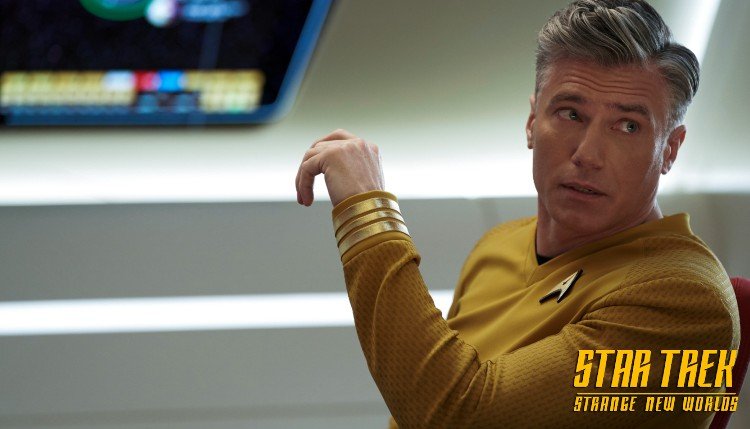Star Trek Rewind: “Strange New Worlds”
“Hit it.”*
SPOILERS ABOUND! BEWARE! If you remove all of the random details of “Strange New Worlds,” the pilot episode of the eponymous series (this latest entry into the Star Trek franchise), and concentrate on the story alone, this is not a terrible episode. A planet in a first contact situation is revealed to have abducted “Number One” (Rebecca Romjin) and stolen warp technology to produce weapons of mass destruction. It’s up to Captain Christopher Pike (Anson Mount) and Science Officer Spock (Ethan Peck) to rescue her and clean up this mess.
On the periphery, it’s not a bad story, and it mercifully ends, rather than become a season-long story arc. Unfortunately, the story takes a backseat to bizarre nuance and mindless minutiae. The deceptive nuance of Strange New Worlds starts with the reversal of traditional gender roles. I’m not talking about Pike’s comparably young-ish girlfriend waking up after a rollicking night of wild 23rd-century sex to the smell of pancakes made by her man before she ships out to captain a starship.
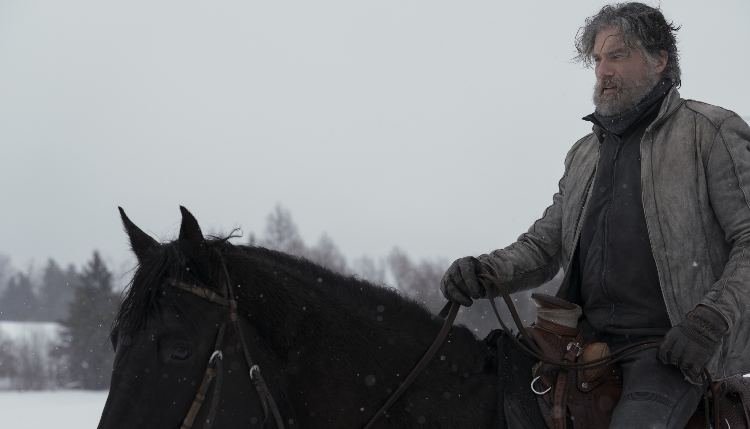
That’s fine. I cook for my wife. I make the greatest French toast in the universe, and she is seriously a lucky woman for that. I’m not even talking about the fact that we have a bad-ass female chief of security who refuses a sedative when she is given painful cosmetic genetic enhancements so she (and the rest of the landing party) can beam down to a planet unobserved. What I am talking about is the total erasure of canon, as well as an unbalanced demographic on the bridge.
When we’re introduced to Spock, he has just accepted T’Pring’s proposal of marriage. See how we’ve subverted expectations? “Amok Time,” an episode about Spock’s arranged marriage and combat for possession of a woman, was one of the greatest hours of Star Trek ever produced, but nevermind. We’re required to be “progressive.” When we get to the ship (as with Discovery), the crew is overwhelmingly female (as well as non-white).
The bridge compliment is made up of five female officers to two male officers. Additionally, there is a troubling undercurrent of individualism among the crew. Not one member of the crew wears an identical uniform. Why? I understand depictions of women in Treks of the past were less than stellar. Uhura was a glorified telephone operator (and was also Gene Roddenberry’s lover). Christine Chapel did nothing but chrispine** over Spock (and was also Gene Roddenberry’s lover).
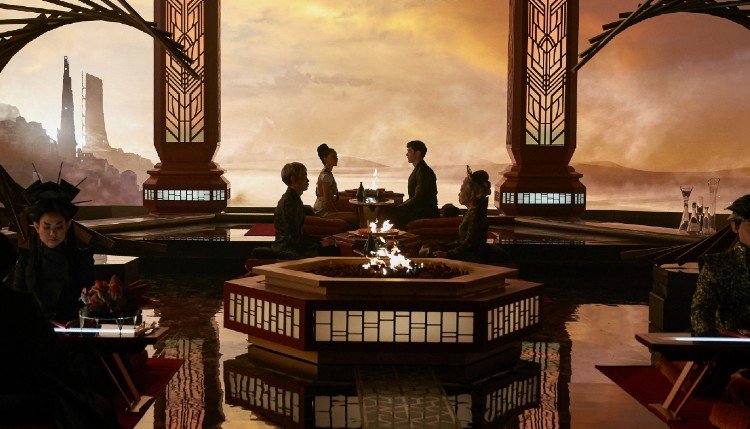
Yeoman Rand was awesome, but after actress Grace Lee Whitney was sexually assaulted by a “network executive,” she was shown the door. Yes, it was disgusting to see how women were treated in late ’60s television, but any amount of retconning and characterization of women in today’s world of entertainment isn’t going to change that, and it isn’t going to make anything better. Today, woman enjoy unparalleled parity to the point that men must be denigrated in order to empower women.
Now, the problem with this is if you have performers who can convey confidence over smug superiority, you’re golden, but so many young actresses confuse the two concepts. This is one of my many gripes about Discovery’s Michael Burnham. This isn’t exactly new ground. Even before the days of Uma Thurman’s Bride, Captain Janeway, and Ripley from the Alien franchise, we had Russ Meyer and Roger Corman, who made movies that featured confident, strong (and sexy) leading ladies. We also had Anne Francis as Honey West, which premiered a full year before the Original Series.
Speaking of sex … it’s over. Gone. Done. Finished. Any sexuality the franchise once had has been completely drained. Discovery was mostly angry lust (as most sex is depicted these days). Picard is about an old man, so no help there. Strange New Worlds, in addition to populating the cast with largely unattractive people, castrates and pacifies the men and women in the cast. Mount is a good-looking guy, but it’s almost like he’s not permitted to be a man. Star Trek was, once upon a time, a series that showcased beauty in all its many forms.
Indeed, Pike is given not one heroic deed to perform, unless you count scaring the bejesus out of the population of a planet by displaying the awesome power and might of a starship. This would all be fine if it mattered to the story, but it doesn’t. Remember the female-dominated planet in the Next Generation episode, “Angel One?” That mattered. Here, it’s like a point needs to be made, and it is unnecessary. The women get the clever ideas, all of them. The women get the spotlight with their antics and “humor.” The women are really all that matter in this rewritten 23rd century.
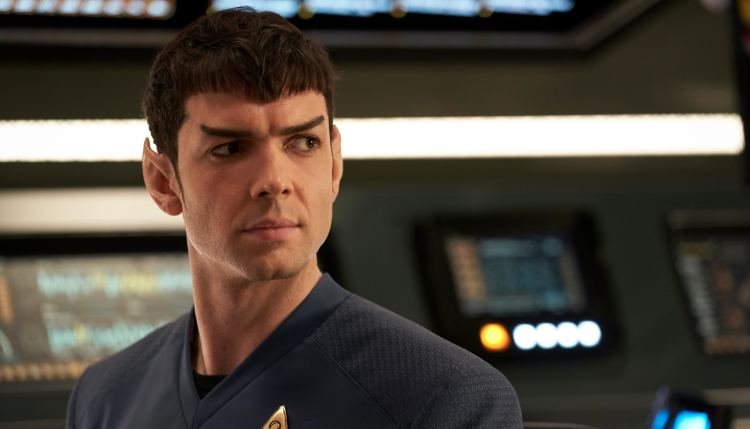
Mount has nothing to do but react to them. His is a neutered Pike, bereft of machismo or even plain old male charm. He’s soft-spoken, less critical and abrasive than Jeffrey Hunter’s Pike. He may be far removed from the “Brother” episode of Discovery that introduces him, but you don’t de-fang a man because of manufactured circumstances beyond his control. What happens when you strike the wolf? The wolf bites you. The writers make Pike reticent about command, thus making his character amenable and broken. They got it wrong. They should’ve made him the angry wolf.
There’s nothing wrong with that. Hunter’s Pike was also mulling a decision to resign before the events of “The Cage.” Why do we have to use that device twice? The writers are using previous behaviors to make Pike wishy-washy. That’s not a good quality for a starship captain, methinks. Pike, Spock, and aforementioned security bad-ass beam down to a planet poised at the brink of civil war using the stolen warp technology to make warp bombs (huh?).
They rescue “Number One,” whose name is actually Una Chin-Riley, which is adorable, frankly, but then Pike hangs around long enough to lecture these aliens. He tells them, “War is bad, m’kay,” and he uses us as an example. He tells the Enterprise to send video clips of our planet’s history of aggression. You’d think he go for World War II, 1968, Kent State or possibly 9/11 but no he uses January 6th. Excuse me? An alien planet is at war with itself. That is the very definition of a “world war” but Pike thinks this is a “civil war.” We know why, of course.
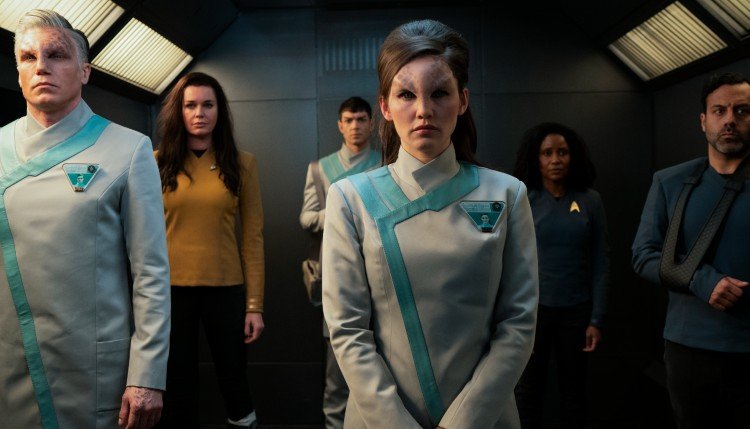
It isn’t enough to call January 6th the preamble to a civil war (I mean, we actually did have a civil war from 1861-1865), we have to hammer the point home. I don’t know how a bunch of tik-tokers, millennials, and red necks walking around in a government building counts as a civil war, but here we are. This is true political division, not analogy, which is where Star Trek succeeds and Strange New Worlds fails. I know the show is being hailed as a return to form by being (gasp!) episodic, but only three things happen over the course of the show’s running time.
Maybe something good will come of this. It’s a better pilot than “Encounter at Farpoint,” “Caretaker,” and “Emissary,” but that’s only because it stays safely within the lines of the modern presumption of what Star Trek is; namely phasers, prime directive, pointed ears, and red alert. That’s all the kids think about. Those four items. They don’t care about the Kirk-Spock-McCoy dynamic, the essentials of exploration, the sense of utopia, or the blistering satire and allegory. Like all great science fiction, Star Trek was never safe. Making it safe de-fangs an angry wolf.
*I assume this is Pike’s tag-line. Like Picard’s “engage” or “make it so.” I like it. It gets right to the point. Take us out. Let’s see what’s out there. Thataway! There’s still much to do. Still so much to learn. Second star to the right. And straight on ’til morning.
**Sorry.

